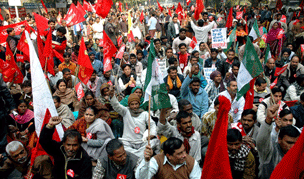 People's Democracy
People's Democracy
(Weekly
Organ of the Communist Party of India (Marxist)
No. 51
December 18, 2005
(Weekly
Organ of the Communist Party of India (Marxist)
|
Vol.
XXIX
No. 51 December 18, 2005 |
Countrywide Protest Against WTO

Anti-WTO protestors at Jantar Mantar in New Delhi on December 13
SURGES of protests in the form of rallies, marches, conventions, and factory-level gate-meetings marked December 13 through out the country condemning WTO’s neo-imperialist ploys of squeezing developing countries. The protests coincided with the opening of the ministerial meeting of WTO at Hong Kong on the day and also coincided with the worldwide protests against WTO.
In Delhi, a massive rally culminated in a dharna at the parliament street which was addressed by leaders of the Left parties and variety of activists of the ‘People Against WTO Committee’.
Chanting slogans to stop the destructive advance of the WTO and cautioning the government not to succumb to the US and European Union pressures, the protestors conveyed their opposition. The CPI(M) Rajya Sabha floor leader, Niltopal Basu while addressing the dharna underlined that the fight for safeguarding country’s economic sovereignty has to be fought both inside and outside parliament, in the villages, towns and cities of the country. Other speakers at the dharna included CPI general secretary, A B Bardhan, convenor of the anti-WTO campaign, S P Shukla and others.
Posters affirmed Indian solidarity with developing countries in the WTO, while others stated that no deal is better than a bad deal in the WTO meet. The common call was for the Indian government to stand up to the pressures being mounted by the US-EU combine and side with the developing countries. The dangers of a surrender at Hong Kong to the farmers of the country were particularly highlighted.
Reports of protest demonstrations and conventions came from different parts of the country. In Punjab, a big farmers convention against WTO was organised in Jalandhar while three agricultural labour conventions and dharnas were organised in Amritsar, Nawa Shahar and Sangrur. In UP agricultural workers and farmers led the protests in many places. A torchlight procession against WTO was taken out in Sahranpur while Varanasi witnessed three days of programmes as part of protests.
The protest organised throughout the urban and rural areas of Bengal was also against the infirmity of attitude of the UPA-led union government vis-à-vis the WTO’S kow-towing to the rich countries and thinking nothing of sacrificing the national economic interests of the developing world.
The programme was held under the aegis of the Left TU’s and Left mass organisations. Protest actions were held in all the districts from the chilly north to the balmy south as people came out in their lakhs to denounce the agenda and negotiations of the Hong Kong round of the WTO.
The protest demonstrations in Bengal and in the rest of the country were attuned to and in solidarity of the massive protests going on in Hong Kong itself a glimpse of which was carried in the Ganasakti with a despatch by CPI (M) MP Rupchand Pal from the venue of the conference.
Among the protest actions held were several torchlight processions in the industrial belt of south Bengal, and large kisan rallies in central, western, and north Bengal.
In his address to the Kolkata rally held at Rani Rashmoni Road, Bengal CITU general secretary Kali Ghosh said that the strength of popular protest had at least partially stalled the Cancun round of the WTO. The weak-kneed attitude of the union government of India towards the WTO’S attitude and outlook had created since then a sense of fear in the country.
India must stand united at Hong Kong with the developing world and the progressive forces and boldly state that the developed world must withdraw agricultural subsidies and reduce duties on imports from the developing world.
The Indian government, said CITU president Shyamal Chakraborty, must aim to serve the interests of the nation rather than those of the imperialists. He expressed surprise at the way the union ministers had gone ahead to attend the Hong Kong meeting without ever consulting the state governments. Agriculture, Chakraborty, said did remain a concurrent subject.
What the union government must never forget, warned Chakraborty, was that the WTO did not believe ever in a level playing field and that the avowed aim of the WTO was to bolster imperialist globalisation. India, instead of appearing to be weak and dependent, should lead the developing countries in the struggle against the WTO’S misdeeds, concluded Chakraborty.
(B Prasant)